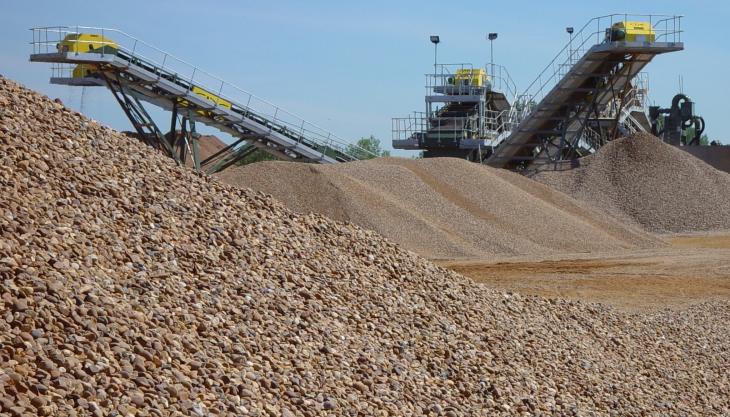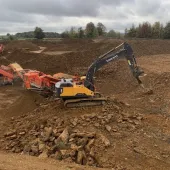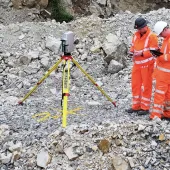MPA reiterates need for mineral planning system reset

New government report prompts fresh calls from the Association to reinforce mineral planning
A NEW government report on the supply of essential aggregates is the strongest evidence yet of the need to reinforce the mineral planning system, according to the Mineral Products Association (MPA).
The MPA has welcomed this month’s publication of the Aggregate Minerals Survey for 2019 (AM2019) by the Ministry of Housing, Communities & Local Government as a further sign of the Government’s renewed commitment to the long-established Managed Aggregate Supply System (MASS).
AM2019, prepared by the British Geological Survey, is vital for policy makers and mineral planners at national and local level as it forms a key component of the MASS – the system intended to ensure a steady and adequate supply of essential aggregates for construction and industry.
Using 2019 data provided by mineral operators through a confidential survey, the report gives a detailed analysis of primary aggregates sales volumes, inter-regional flows, transportation, consumption and permitted reserves in England and Wales.
The MPA has repeatedly highlighted that government policy, particularly around the delivery of housing and infrastructure, assumes that mineral products such as aggregates (and downstream products such as concrete and asphalt) are in plentiful supply.
However, although Britain has an abundance of mineral resources, securing the reserves to meet the country’s demands requires long-term planning, monitoring and continual management, and AM2019 is a critical part of that process.
The MPA is calling for the findings of AM2019 be used to support the early publication of updated National and Sub-National Guidelines on Future Aggregate Provision, the need for which was also reaffirmed in the recently revised National Planning Policy Framework (July 2021).
However, because the Aggregate Minerals Survey is the only nationally co-ordinated data collection exercise of its kind – and is only carried out every four or five years – the MPA warns that reliance on its ‘spot’ data means that trends have to be inferred between surveys. This, says the Association, significantly increases the risk of inaccurate assumptions being made around the health and sustainability of the reserve base for construction aggregates.
For example, although direct comparisons between the previous AM2014 and most recent AM2019 data suggest the permitted reserve base has remained broadly flat, the new report notes that ‘…reserves, in particular of crushed rock, were likely under-reported to the AM2014 survey for a number of regions’.
MPA executive director Mark Russell said: ‘Aggregate minerals surveys are a vital part of the Managed Aggregate Supply System, but AM2019 highlights the risks of relying on occasional datasets to support the management of the largest material flow in the national economy.
‘Indeed, the MPA’s own analysis, informed by published regional aggregate working party reports, suggests that the reserves reported in the 2014 survey were around 500 million tonnes short of the true reserve base.
‘On this basis, AM2019 would show a continuing decline in the reserve base of essential construction minerals alongside a fall in the number of production sites, reflecting the long-term under-replenishment of mineral reserves detailed in our own Annual Mineral Planning Survey reports.’
Nigel Jackson, chief executive of the MPA, said: ‘Government must act quickly on the results of AM2019 and use these data as a solid foundation for the development of revised National Guidelines and reinforcement of the mineral planning system which is faltering from a lack of regular and reliable data and resources.
‘The supply of aggregates must be planned, monitored, and managed consistently, strategically and for the long term to ensure the right minerals are made available in the right place and at the right time to meet the nation’s needs. The maintenance of a steady and adequate supply is essential to achieving the Government’s ambitions around housing and infrastructure, alongside its wider economic, social and environmental aspirations.
‘The uncertainty about data in the 2014 survey supports the need for immediate reinstatement of the Annual Mineral Raised Inquiry which was dismissed by the Government in 2014 against our advice. It is ludicrous that strategic planning for aggregate minerals, which are the lifeblood of the construction industry, is reliant on a twice-a-decade survey whose funding seems to be eternally at risk.
‘We’re repeating our call for the Planning Bill to ‘make the link’ between built development and the need for minerals, as highlighted by the recent Select Committee report. And we want to see a ‘national statement of need for minerals’ as part of a reset of the mineral planning system, which has been starved of investment and resources for far too long.’









